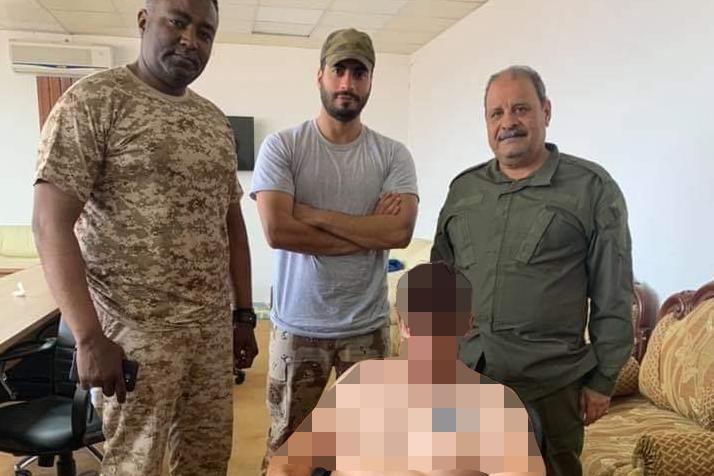Ex-air force US ‘mercenary’ released by Libyan militant captors after being held for six weeks
American-accented man initially claimed to be Portuguese

Your support helps us to tell the story
From reproductive rights to climate change to Big Tech, The Independent is on the ground when the story is developing. Whether it's investigating the financials of Elon Musk's pro-Trump PAC or producing our latest documentary, 'The A Word', which shines a light on the American women fighting for reproductive rights, we know how important it is to parse out the facts from the messaging.
At such a critical moment in US history, we need reporters on the ground. Your donation allows us to keep sending journalists to speak to both sides of the story.
The Independent is trusted by Americans across the entire political spectrum. And unlike many other quality news outlets, we choose not to lock Americans out of our reporting and analysis with paywalls. We believe quality journalism should be available to everyone, paid for by those who can afford it.
Your support makes all the difference.The bloodied pilot first told his captors his name was Jimmy and he was Portuguese. He told them he was hired by the UN-backed government in Libya’s Tripoli to bomb “infrastructure” in defending the city during the messy, ongoing conflict.
But Jimmy’s accent, as he was grilled on video by the forces of Khalifa Haftar now besieging Libya’s capital, clearly gave him away as North American. The US ambassador to Libya, currently quartered in neighbouring Tunisia, sent a letter to Mr Haftar asking about the pilot, according to an analyst who saw a copy of the document.
“After investigating the pilot, he said that he has American citizenship and is of Portuguese origin and holds Portuguese citizenship and is coming through the state of Qatar,” Akram Bouhlaiga, spokesman for the Libyan National Army, told The Independent.
Citing unnamed sources, The Washington Post reported late on Tuesday that 31-year-old Florida man Jamie Sponaugle, a former US Air Force veteran pilot, had been freed after efforts by Saudi interlocutors.
“We are always pleased to see Americans held captive overseas returned home to their friends and family,” Ambassador for Hostage Affairs Robert O’Brien, told The Post. “We appreciate his captors’ decision to release him.”
Mr Sponaugle’s fate highlights the murkiness and chaos of the two-and-a-half month conflict over Tripoli, in which Mr Haftar’s forces, backed by Egypt, the United Arab Emirates and Saudi Arabia, are attempting to wrest control of the capital from a UN-backed government supported by a loose coalition of armed groups from western Libyan cities and towns.
In May, Haftar's forces announced that they had shot down a fighter jet over Tripoli, and captured its 'European' pilot.
But over the course of his six weeks in captivity, analysts closely following Libya learned that it was actually an American pilot, likely working as a mercenary, who had been captured south of Tripoli on 6 May by Haftar's forces, the LNA. Both sides in the conflict appear to be retaining foreign mercenaries, and receiving international military support despite a UN arms embargo on Libya.
“Three days after he was captured, I was informed by a US contact that the pilot was an American,” Arnaud Delalande, an independent security and defence analyst focused on Libya, told The Independent.
In a television appearance late Tuesday, Fayez Serraj, the prime minister of the Tripoli-based authority, disavowed any knowledge of Mr Sponaugle. That’s likely because he may have been hired by the pro-GNA city of Misurata, which operates as a semi-autonomous enclave.
Misrata, a western Libyan city that operates autonomously, had hired Ukrainian technicians four years ago to restore its dilapidated fighter jets, and has previously hired other mercenaries to pilot other aircraft, according to reports.
“It’s difficult to find local or African pilots,” said Mr Delalande. “They’ve used mercenaries in the past to pilot both French Mirage F1 and Russian MiG-20s.”
Mr Bouhlaiga claimed that Mr Sponaugle was brought from Qatar, who along with Turkey supports the Tripoli government, to Misrata. “They brought this (pilot) to Libya to fight the Libyan army,” he said.
Mr Bouhlaiga said that the pilot “admitted” that his trip to Libya was in coordination with Qatar and the Libyan branch of the Muslim Brotherhood organisation.
In a statement to The Independent, a Qatari official said: "Qatar categorically denies any connection to this incident and affirms that it doesn’t support any mercenaries."
The allegation that Mr Sponaugle was assisted by Qatar was, the official added, "a clear attempt by the LNA to win favour with its sponsors – Saudi Arabia, the UAE and Egypt."
In April, Doha called for an effective arms embargo against Haftar’s forces.
Last week Turkish President Recep Tayyip Erdogan admitted publicly for the first time that Turkey was sending military material to Libya.
Join our commenting forum
Join thought-provoking conversations, follow other Independent readers and see their replies
Comments